10 Best Forklift Brands in 2025
- April 2, 2024
- 1 comment
The forklift industry has transformed, raising the question: which forklift brand is best? Moving beyond basic tasks of lifting palletized goods, forklifts now perform a variety of functions across warehouses, construction sites, and container terminals. Selecting the right brand is pivotal for achieving operational efficiency, safety, and maximum productivity. This guide delves into the best forklift brands of 2025, categorized by their distinctive strengths and the needs of their target audience.
List of Best Forklift Brands in 2025
Toyota
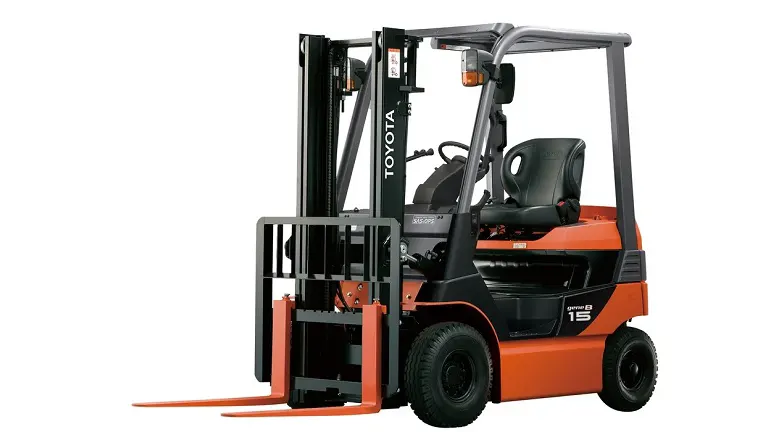
Toyota pioneered its forklift division in 1956, leveraging its automotive expertise to innovate in material handling. With a focus on efficiency, safety, and reliability, Toyota diversified its offerings to meet growing industrial demands, introducing landmark technologies like the System of Active Stability. Today, as a global forklift leader renowned for quality and technological advancements, Toyota has produced over a million units, earning widespread acclaim for durability, minimal downtime, and productivity-enhancing features. Toyota’s forklifts are indispensable in various sectors, reflecting the brand’s commitment to excellence and its significant impact on logistics and supply chain efficiency.
Advantages of Toyota Forklifts
- Reliability: Toyota’s commitment to quality manufacturing ensures that their forklifts are dependable and have a long service life, reducing downtime and maintenance costs.
- Innovative Technology: With features like the System of Active Stability (SAS), Toyota forklifts offer advanced safety and efficiency, enhancing productivity in various operational environments.
- Wide Range of Models: Toyota offers a diverse lineup of forklifts, including electric, internal combustion, pallet jacks, and order pickers, catering to different industry needs and applications.
- Environmental Sustainability: Toyota leads in developing eco-friendly electric forklifts, which are energy-efficient and produce lower emissions, aligning with green initiatives.
- Operator Comfort and Ergonomics: Toyota forklifts are designed with operator comfort in mind, featuring ergonomic controls, spacious cabins, and smooth handling to reduce operator fatigue and boost productivity.
- Global Support Network: Toyota’s extensive dealership and service network provide prompt and reliable support, ensuring parts availability and expert maintenance services worldwide.
- Resale Value: Toyota forklifts retain their value better than many other brands, making them a smart investment in the long term.
- Customization and Accessories: Toyota offers a range of customization options and accessories, allowing businesses to tailor their forklifts to specific operational requirements.
CAT (Caterpillar)
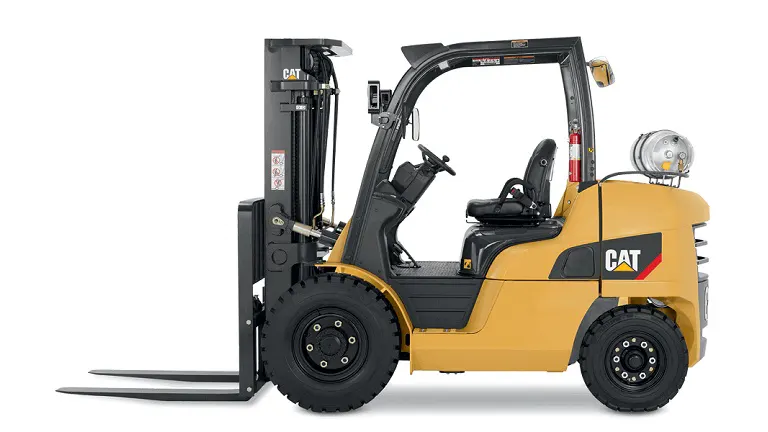
Caterpillar, traditionally known for its heavy machinery, entered the forklift sector in the 1960s, leveraging its expertise in durable construction equipment. By integrating robust engineering principles from its construction machinery, CAT quickly established itself as a formidable player in the forklift market. In the decades following, CAT expanded its product line to include both diesel and electric models, addressing the growing demand for versatile material handling solutions. Today, CAT is recognized globally for its high-capacity forklifts, particularly favored in construction, mining, and heavy industry. The brand has produced tens of thousands of forklifts, contributing significantly to its reputation for rugged, reliable equipment capable of handling the most challenging tasks. Customers value CAT forklifts for their durability, powerful performance, and the brand’s extensive service network ensuring longevity and high operational uptime.
Advantages of CAT (Caterpillar) Forklifts
- Durability: CAT forklifts are built to endure the most demanding conditions, synonymous with the ruggedness expected from Caterpillar machinery.
- Versatility: Offering a wide selection of models, including diesel, gas, and electric forklifts, CAT serves a broad range of industries from construction to warehousing.
- Ease of Maintenance: Designed with serviceability in mind, CAT forklifts ensure ease of maintenance, minimizing downtime.
- High Lifting Capacity: Known for their power, CAT forklifts are capable of handling heavy loads, making them suitable for intense lifting tasks.
- Operator Safety and Comfort: CAT forklifts feature ergonomic designs and safety features that promote operator comfort and reduce the risk of accidents.
- Parts Availability: Caterpillar’s extensive global dealer network ensures that parts and service support are readily available worldwide.
Linde
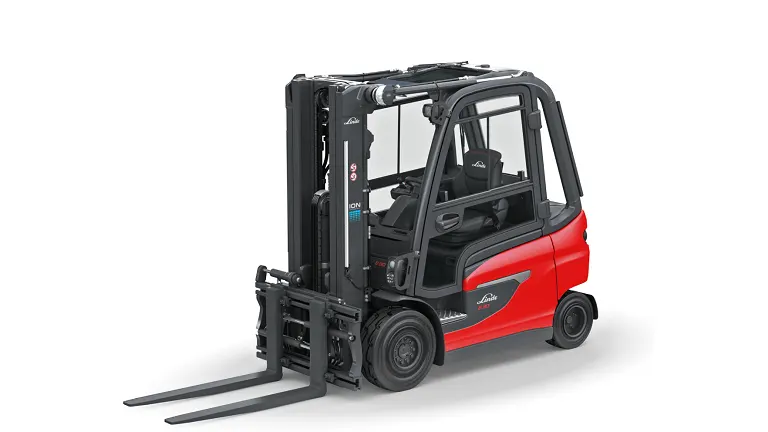
Linde entered the forklift market in 1904, initially focusing on heavy equipment. By the 1950s, Linde had pioneered hydrostatic drives, significantly enhancing forklift efficiency and control. Throughout the 60s and 70s, Linde expanded its offerings, introducing electric models alongside traditional combustion engines to cater to a broader range of industrial needs. Today, Linde stands as a global leader in the forklift industry, with a strong presence in Europe and significant market shares worldwide. The company has produced hundreds of thousands of units, serving various industries with its innovative technology and commitment to operator comfort. Linde’s forklifts are acclaimed for their advanced engineering, delivering superior performance and reliability that customers have come to rely on for their material handling needs.
Advantages of Linde Forklifts
- Innovative Technology: Linde forklifts incorporate cutting-edge technologies, such as hydrostatic drives and energy-efficient systems, to enhance operational efficiency.
- Operator Comfort: Focused on ergonomics, Linde designs forklifts that reduce operator fatigue with intuitive controls and comfortable seating.
- Energy Efficiency: Linde is a leader in developing electric forklifts with long battery life and low energy consumption, promoting sustainability.
- Precision and Control: Linde forklifts offer excellent maneuverability and precision, making them ideal for tight spaces and delicate handling tasks.
- Durable Design: Built to last, Linde forklifts are known for their robust construction and long-term reliability.
- Customization Options: Linde offers various customization options to meet specific operational needs, enhancing versatility and productivity.
Hyster
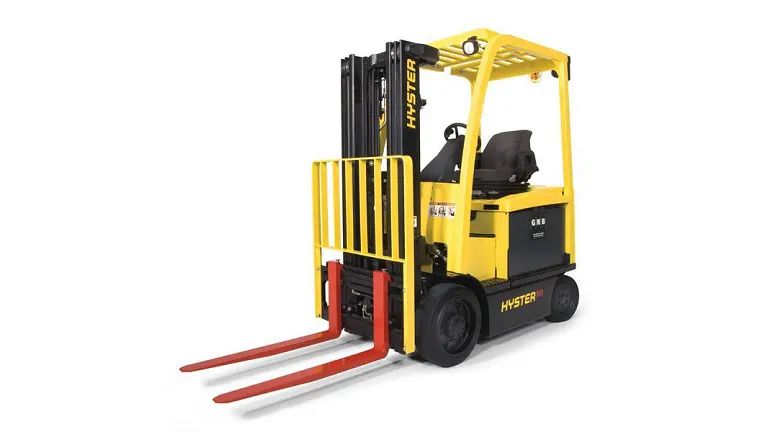
Hyster began manufacturing lifting machines and forklifts in the late 1920s, becoming one of the earliest innovators in the material handling industry. The brand gained prominence in the mid-20th century by introducing a range of forklifts designed to meet the diverse needs of post-war industries, from warehousing to heavy-duty outdoor applications. Over the years, Hyster has continually evolved its product offerings, incorporating advanced technologies and ergonomic designs to enhance efficiency and operator safety. As of today, Hyster is a globally recognized brand, particularly noted for its robust pneumatic tire forklifts and versatile electric models. With hundreds of thousands of units in operation worldwide, Hyster maintains a strong market presence, offering reliable and cost-effective solutions across a spectrum of industries. Customer loyalty to Hyster is driven by the brand’s commitment to durability, affordability, and a comprehensive range of lifting capacities.
Advantages of Hyster Forklifts
- Broad Product Range: Hyster provides a comprehensive range of forklifts, including high-capacity, heavy-duty models and compact, maneuverable warehouse trucks.
- Affordability: Known for offering reliable material handling solutions at competitive prices, Hyster forklifts deliver excellent value for money.
- Global Network: Hyster’s extensive network of dealers and service centers ensures effective after-sales support and parts availability.
- Innovative Features: With features like advanced telematics and ergonomic designs, Hyster forklifts improve operational efficiency and safety.
- Custom Solutions: Hyster works closely with clients to provide customized forklift solutions tailored to specific industry requirements.
- Environmental Consideration: Hyster offers a range of electric forklifts and LPG models designed to reduce emissions and environmental impact.
Yale
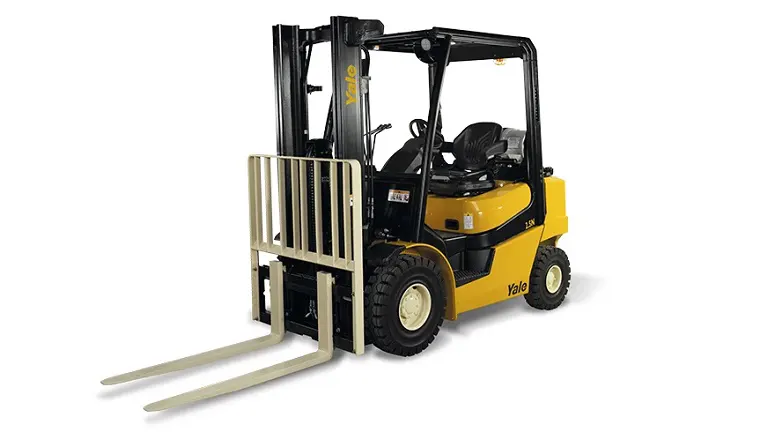
Yale’s foray into the forklift industry began in the early 20th century, with the brand quickly becoming synonymous with innovation and quality in material handling. Yale was among the first to introduce electric battery-powered lift trucks in the 1920s, marking a significant shift towards more efficient and cleaner energy sources in industrial environments. Throughout the 20th century, Yale expanded its range to include a variety of models, from compact electric riders perfect for tight warehouse spaces to robust internal combustion forklifts for outdoor applications. Presently, Yale is recognized as a leading forklift brand, with a strong foothold in both the North American and global markets. The brand’s dedication to innovation, operator comfort, and environmental sustainability has resulted in the production of hundreds of thousands of forklifts. Yale’s consistent delivery of high-quality, user-friendly, and efficient forklifts has cemented its reputation among customers seeking reliable material handling solutions.
Advantages of Yale Forklifts
- Versatility: Yale provides a wide assortment of models, including electric, gas, and diesel forklifts, suitable for various applications from warehouse operations to outdoor use.
- Ergonomic Design: Emphasizing operator comfort, Yale forklifts feature ergonomic controls and comfortable seating, reducing fatigue and enhancing productivity.
- Durability: Known for their robust construction, Yale forklifts are built to withstand rigorous use, ensuring longevity and reliability.
- Advanced Technology: Incorporating the latest technology, Yale forklifts offer features like innovative transmission systems and intuitive control panels for improved efficiency and safety.
- Energy Efficiency: Yale’s electric forklifts are designed with energy efficiency in mind, offering eco-friendly solutions with lower emissions and reduced energy consumption.
- Global Support: Backed by an extensive dealer network, Yale provides exceptional after-sales support, including maintenance services and parts availability, ensuring minimal downtime.
- Customization Options: Yale forklifts can be customized with a variety of attachments and accessories, making them adaptable to specific material handling needs.
- Safety Features: Yale prioritizes safety with features such as automatic speed reduction on turns and mast locking mechanisms to protect operators and loads.
Nissan
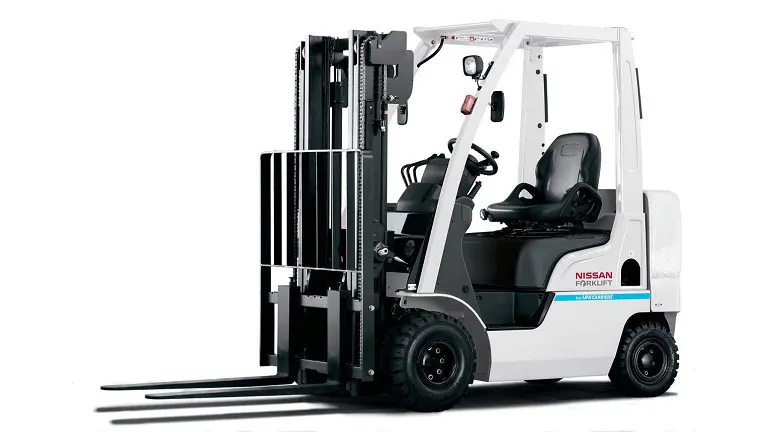
Nissan ventured into the forklift industry in the 1950s, initially focusing on electric models that emphasized compact design and energy efficiency. As the market evolved, Nissan broadened its offerings to include internal combustion forklifts, catering to a wider array of industrial needs. By continuously integrating automotive-inspired technology and innovation, Nissan forklifts became known for their reliability and ease of use. Today, Nissan, now part of the UniCarriers group, is recognized for producing a substantial number of forklifts globally, with a strong reputation for fuel efficiency and ergonomic design, ensuring operator comfort and productivity.
Advantages of Nissan Forklifts
- Fuel Efficiency: Nissan forklifts are engineered for optimal fuel efficiency, particularly in their internal combustion models, reducing operational costs.
- User-Friendly Controls: With an emphasis on ease of use, Nissan forklifts feature intuitive controls and ergonomic designs, enhancing operator comfort and productivity.
- Compact Design: Nissan excels in producing compact forklift models, ideal for maneuvering in tight spaces, making them perfect for warehouse and indoor applications.
- Reliability: Nissan forklifts have a reputation for reliability and durability, with a strong track record of performance and minimal downtime.
- Advanced Technology: Incorporating advanced technology, Nissan forklifts offer features like regenerative braking in electric models, contributing to energy efficiency and extended battery life.
- Versatile Range: Nissan offers a diverse range of forklifts, including electric, LPG, and diesel models, catering to various industrial needs and applications.
- Global Support Network: With a comprehensive global dealership and service network, Nissan provides reliable after-sales support, ensuring easy access to parts and maintenance services.
- Environmental Commitment: Nissan is committed to environmental sustainability, with many of its forklift models designed to minimize emissions and environmental impact.
Komatsu
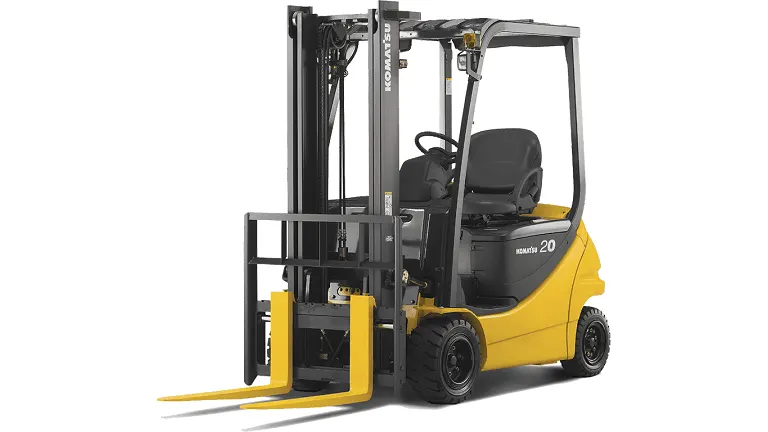
Komatsu, established as a heavy equipment manufacturer, entered the forklift market in the early 1960s, leveraging its expertise in engineering and manufacturing to produce durable and reliable forklifts. Komatsu forklifts are designed with an emphasis on safety, operator comfort, and environmental sustainability, reflecting the company’s commitment to quality and innovation. Today, Komatsu is a prominent figure in the forklift industry, offering a diverse product line that includes electric, internal combustion, and hybrid models. The brand is acclaimed for its high lifting capacities and advanced features, serving various industries worldwide.
Advantages of Komatsu Forklifts
- Durability and Strength: Built with the ruggedness expected from Komatsu’s construction machinery lineage, these forklifts are designed to endure challenging conditions and heavy-duty use.
- Technological Innovation: Komatsu incorporates advanced technologies in its forklifts, including hydrostatic transmission and KOMTRAX, a proprietary fleet management system, enhancing efficiency and operational oversight.
- Operator Safety and Comfort: Emphasizing ergonomic design, Komatsu forklifts provide comfortable operating environments and safety features that reduce fatigue and risk of accidents.
- Environmental Consideration: With a focus on reducing environmental impact, Komatsu offers electric forklift models and implements eco-friendly practices in manufacturing and operations.
- Versatile Product Range: Catering to a broad spectrum of industries, Komatsu’s range includes electric, internal combustion, and warehouse forklifts, meeting diverse material handling needs.
- High Lifting Capacity: Komatsu forklifts are known for their high lifting capacities, capable of handling substantial loads, which is beneficial for industries requiring heavy lifting.
- Global Support Network: Komatsu’s extensive service network ensures prompt and reliable after-sales support, maintenance services, and parts availability worldwide.
- Quality and Reliability: Leveraging over a century of engineering expertise, Komatsu forklifts are synonymous with quality and reliability, ensuring long-term operational efficiency.
Clark
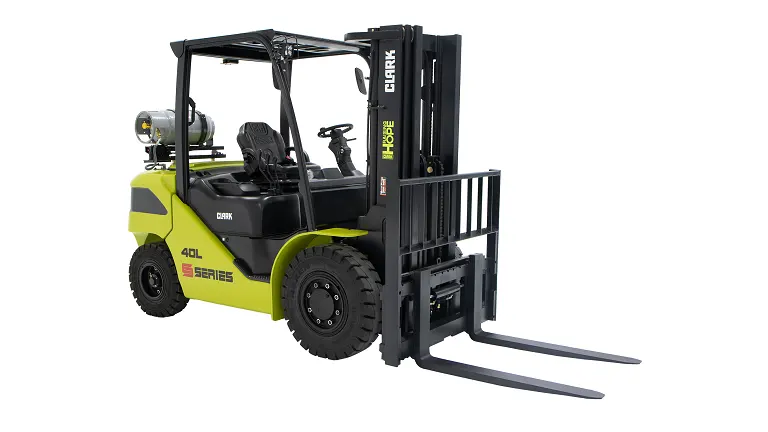
Clark is credited with inventing the world’s first forklift truck in 1917, pioneering the material handling industry. Over the decades, Clark has expanded its product range to include electric and internal combustion forklifts, known for their durability and ease of maintenance. With a focus on innovation and customer satisfaction, Clark has maintained a strong presence in the global market, producing hundreds of thousands of units that are in use today. Clark forklifts are celebrated for their affordability and versatility, catering to a wide range of applications and industries.
Advantages of Clark Forklifts
- Historical Innovation: As the inventor of the first forklift truck, Clark has a long history of pioneering developments in the forklift industry, continuously introducing features that enhance performance and safety.
- Durability: Known for their sturdy construction, Clark forklifts are built to last, capable of withstanding rigorous use in various industrial environments.
- Wide Product Range: Clark offers a diverse lineup, including electric, gas, and diesel forklifts, along with warehousing equipment, catering to a wide range of material handling needs.
- Ease of Maintenance: Designed with accessibility in mind, Clark forklifts facilitate easy maintenance and service, helping to minimize downtime and keep operations running smoothly.
- Affordability: Clark forklifts are competitively priced without compromising on quality, offering excellent value for businesses looking to optimize their material handling costs.
- Operator Comfort and Safety: Emphasizing ergonomic design, Clark forklifts provide comfortable operating conditions and incorporate safety features to protect operators and enhance productivity.
- Global Network: Supported by an extensive dealer and service network, Clark ensures reliable after-sales support, parts availability, and service expertise worldwide.
- Environmental Responsibility: Clark is committed to sustainability, offering electric models and implementing eco-friendly practices in its operations and product designs.
Mitsubishi
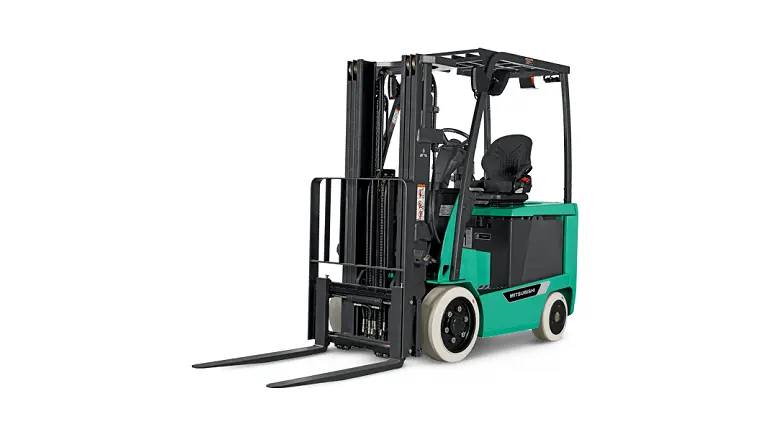
Mitsubishi entered the forklift market in the 1980s, quickly establishing itself as a key player through its focus on innovation, reliability, and service excellence. Mitsubishi forklifts are designed to offer superior performance, particularly noted for their electric models that provide exceptional efficiency and environmental benefits. With a comprehensive lineup that includes electric, gas, and diesel forklifts, Mitsubishi caters to a broad spectrum of industrial requirements. The brand’s commitment to quality and customer service has resulted in a vast global presence, with Mitsubishi forklifts being integral to operations in numerous sectors.
Advantages of Mitsubishi Forklifts
- Reliability: Mitsubishi forklifts are engineered for dependability, ensuring consistent performance and minimal downtime, which is crucial for maintaining productivity in fast-paced environments.
- Innovative Design: Incorporating cutting-edge technology, Mitsubishi forklifts offer advanced features such as energy-efficient electric models, intuitive control systems, and ergonomic designs that enhance operator comfort and safety.
- Wide Range of Models: With a diverse product lineup, Mitsubishi caters to various material handling needs, offering electric, LPG, and diesel forklifts alongside specialized warehouse equipment.
- Fuel Efficiency: Mitsubishi’s internal combustion forklifts are designed for optimal fuel efficiency, reducing operational costs and environmental impact.
- Ease of Maintenance: Designed with serviceability in mind, Mitsubishi forklifts allow easy access to components, facilitating straightforward maintenance and repairs.
- Global Support Network: Mitsubishi’s extensive dealership and service network ensures comprehensive after-sales support, including parts availability and expert maintenance services, across the globe.
- Safety Features: Prioritizing operator safety, Mitsubishi forklifts are equipped with numerous safety enhancements, including stability control systems and visibility features, to protect operators and enhance workplace safety.
- Customization Options: Mitsubishi offers a variety of attachments and customization options, allowing businesses to tailor their forklifts to specific operational requirements, enhancing versatility and efficiency.
Jungheinrich
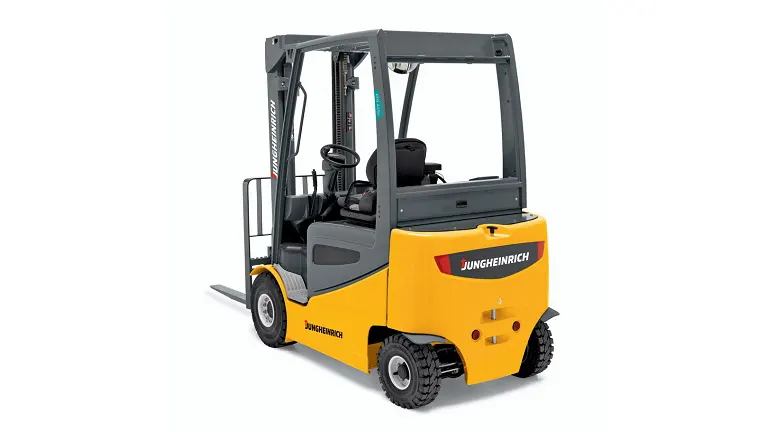
Jungheinrich, founded in 1953 in Germany, has grown to become one of the leading forklift manufacturers in Europe and globally. Known for its innovative electric lift trucks, Jungheinrich has consistently pushed the boundaries of technology, offering solutions that enhance efficiency, safety, and ergonomics. With a strong focus on electric-powered material handling equipment, Jungheinrich has made significant contributions to the development of energy-efficient and environmentally friendly forklifts. The brand’s extensive range of products and services, including automated systems and warehouse solutions, underscores its commitment to meeting the comprehensive needs of its customers.
Advantages of Jungheinrich Forklifts
- Advanced Technology: Jungheinrich leads in incorporating cutting-edge technology in its forklifts, including proprietary AC motors and energy-efficient systems, enhancing performance and reducing operational costs.
- Ergonomic Design: Focused on operator well-being, Jungheinrich forklifts feature ergonomic controls and comfortable cabins, minimizing fatigue and boosting productivity.
- Energy Efficiency: Renowned for their electric forklift models, Jungheinrich offers some of the most energy-efficient forklifts on the market, with long battery life and regenerative braking systems.
- Versatile Range: From pallet trucks to high-reach forklifts, Jungheinrich provides a comprehensive range of material handling equipment, catering to diverse warehouse and logistic needs.
- Warehouse Solutions: Beyond forklifts, Jungheinrich offers integrated warehouse solutions, including automated systems and software, to optimize material flow and storage efficiency.
- Safety Features: With a strong emphasis on safety, Jungheinrich forklifts come equipped with features like speed reduction in turns and automatic parking brakes, enhancing workplace safety.
- Global Support Network: Jungheinrich’s extensive dealer network ensures reliable after-sales support, maintenance services, and parts availability worldwide.
- Sustainability: Committed to environmental responsibility, Jungheinrich emphasizes sustainable practices and products, aiming to minimize environmental impact in its operations and forklift designs.
Types of Forklifts: Choosing the Right Tool for the Job
In the diverse world of material handling, selecting the right forklift is pivotal for operational efficiency and safety. Forklifts are specialized to suit various environments and tasks, from indoor warehousing to rugged outdoor construction sites. Understanding the functionalities and ideal operating environments of different forklift types ensures the selection of the most appropriate equipment for your specific needs.
Warehouse Forklifts (Designed for Indoor Operations)
- Counterbalance Forklift: This ubiquitous forklift features a counterweight in the rear to balance loads lifted by the forks at the front. It’s the standard choice for general indoor tasks, such as moving and stacking palletized goods across warehouse floors.
- Reach Truck: Engineered for narrow aisles, reach trucks have telescoping forks and a mast that can extend to retrieve or place pallets deep within warehouse racking systems. They are essential for optimizing space in warehouses where aisles are minimized to maximize storage.
- Order Picker: Similar to a reach truck but distinguished by an operator platform that elevates along with the forks, order pickers are designed for hand-picking items from racking. They are ideal for fulfilling orders in warehouses that require picking individual items at various heights.
- Walkie Stacker: A compact, pedestrian-operated forklift, the walkie stacker is suitable for light loads and is used for stacking pallets and moving goods over short distances within a warehouse, particularly in areas too confined for larger forklifts.
Industrial Forklifts (Designed for Outdoor and Heavy-Duty Operations)
- Rough Terrain Forklift: With large, pneumatic tires and high ground clearance, rough terrain forklifts are built to navigate uneven outdoor surfaces. They are commonly used in construction sites, lumberyards, and any environment where the ground is irregular.
- Telehandler: This versatile machine combines the lifting capability of a forklift with the reach and height of a crane, thanks to its telescoping boom. Telehandlers are invaluable in construction for moving heavy loads to heights or distances beyond the capabilities of a traditional forklift.
- Side Loader: Unique in its design, the side loader carries loads laterally, with forks that extend from the side, making it ideal for handling long or bulky items like timber or steel beams, which would be impractical with a standard forklift.
Other Specialized Forklifts
- Pallet Jack: Available in manual or electric versions, pallet jacks are the simplest form of forklift, designed for moving pallets short distances. They are a staple in retail and warehouse settings for loading and unloading goods.
- Container Handler: Engineered for heavy-duty tasks, container handlers are used in ports and terminals to stack and transport shipping containers. They are equipped to handle the considerable weight and dimensions of containers, streamlining cargo operations.
Choosing the Right Forklift Type
When selecting a forklift, consider the following key factors to ensure you choose the tool that best matches your operational requirements:
- Lift Capacity: Assess the typical weight of the loads you will be handling to ensure the forklift can safely accommodate them.
- Lift Height: Determine the maximum height you’ll need to stack or retrieve loads, especially relevant in warehousing environments with high racking systems.
- Aisle Width: For operations in warehouses, the width of your aisles will dictate whether you need a standard forklift or a more compact model like a reach truck or walkie stacker.
- Operating Environment: Consider whether you’ll be working indoors, outdoors, or in a combination of environments to choose a forklift designed for those conditions, taking into account factors like terrain and space constraints.
By carefully evaluating these factors, you can select a forklift that enhances your workflow, maximizes safety, and meets the demands of your specific material handling tasks.
Conclusion
In 2025, selecting the ideal forklift brand is crucial for optimizing operational efficiency, safety, and productivity across various sectors. Forklifts have evolved to perform a wide array of tasks, from warehouse operations to outdoor construction and container handling. This guide highlights the top 10 forklift brands, each distinguished by unique strengths and tailored to specific user needs. Toyota leads with its reliable and innovative range, while CAT (Caterpillar) is preferred for its rugged outdoor models. Linde excels in technology and operator comfort, Hyster and Yale offer versatility and ergonomic designs, and Nissan is noted for its fuel-efficient, compact forklifts. Komatsu and Clark are known for their durable and high-capacity machines, Mitsubishi for its reliable and user-friendly designs, and Jungheinrich stands out in electric forklifts and warehouse solutions. When choosing a forklift, factors like lift capacity, height requirements, aisle width, and the operating environment are essential to find the most suitable equipment for your specific material handling needs.
FAQs
- What makes Toyota forklifts stand out in the market?
Toyota forklifts are renowned for their reliability, innovative safety features like the System of Active Stability, and a wide range of electric and internal combustion models, making them versatile for various applications. - Are CAT (Caterpillar) forklifts suitable for indoor operations?
While CAT forklifts are known for their durability in outdoor and rugged environments, models like the CAT NPV Series are designed for efficiency and maneuverability in indoor settings, particularly in narrow aisles. - What technological advancements are Linde forklifts known for?
Linde forklifts are recognized for their pioneering hydrostatic drives and energy-efficient systems, enhancing operational efficiency and providing superior control and comfort for operators. - How do Hyster forklifts ensure affordability without compromising on quality?
Hyster forklifts combine competitive pricing with robust design, offering a broad product range that includes both heavy-duty models for outdoor use and compact electric models for warehousing, ensuring cost-effective solutions without sacrificing durability. - What are the advantages of Yale’s ergonomic forklift designs?
Yale focuses on operator comfort with features such as ergonomic controls and comfortable seating, which reduce fatigue and enhance productivity, making their forklifts ideal for prolonged use in warehousing and distribution. - Can Nissan forklifts operate in tight warehouse spaces?
Yes, Nissan forklifts, particularly the compact electric models, are designed for maneuverability in tight spaces, making them suitable for warehouse operations where aisle width is limited. - What makes Komatsu forklifts suitable for heavy-duty operations?
Komatsu forklifts are built with the durability and strength characteristic of Komatsu’s construction machinery, offering high lifting capacities and advanced safety features for demanding industrial and outdoor applications. - How does Clark maintain its competitive edge in the forklift industry?
Clark, as the inventor of the forklift, continues to innovate with durable and versatile models that are competitively priced, ensuring ease of maintenance and a wide range of options for various material handling needs. - What are the key features of Mitsubishi forklifts that enhance user experience?
Mitsubishi forklifts are designed with a focus on reliability, advanced ergonomic features, and intuitive control systems, providing a user-friendly experience and efficient operation across their electric and internal combustion models. - How do Jungheinrich’s electric forklifts contribute to environmental sustainability?
Jungheinrich’s electric forklifts are at the forefront of energy efficiency and environmental sustainability, offering long battery life, regenerative braking systems, and low energy consumption, aligning with green initiatives and reducing the carbon footprint of material handling operations.
Selecting the right forklift from leading 2025 brands is crucial for enhancing efficiency, safety, and productivity. Each brand offers unique advantages, from Toyota’s reliability to CAT’s outdoor ruggedness and Linde’s advanced ergonomics. Consider key factors like lift capacity and operational environment to choose a forklift that meets your specific needs, ensuring a safer and more efficient workplace.

Charles Hayes
Forestry AuthorI'm Charles Hayes, I bring over 15 years of specialized expertise in landscaping and woodworking, blending artistic design with sustainable environmental stewardship. My career, fueled by a profound passion for the natural world, encompasses extensive education and hands-on experience in creating harmonious, eco-friendly outdoor spaces and responsibly managing forest resources. Recognized for my professional standing, I am committed to continuous learning and certification in cutting-edge practices. My expertise is not only reflected in my work but also in my contributions to community projects, educational workshops, and collaborations with industry leaders. As an authoritative voice in my field, I strive to share knowledge and promote environmentally conscious approaches, making me a trusted resource in landscaping and forestry.

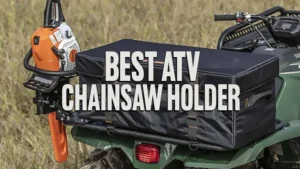
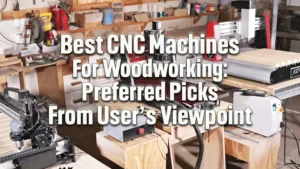


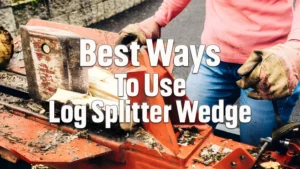

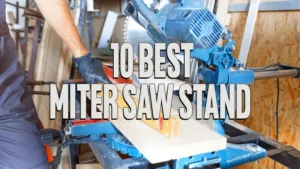
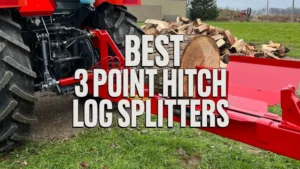
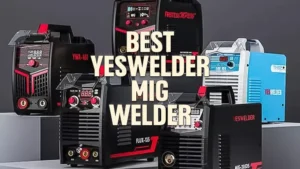
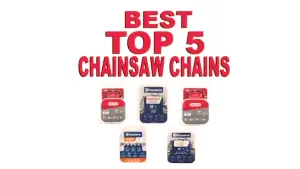


Hello, My name is Isaac Parker with Kroger Co. We're on the hunt for new forklifts and I'm hoping you can help us out. Below are the specifications: Pneumatic Forklifts. 4000 lb Load Capacity Fuel Type: LP / Dual Fuel. Travel Speed: 10.9 - 11.5 MPH Length to Forkface: 115 - 143 in Please send over an FOB quote of the options available along with your credit application form so we can get started. Our payment term is NET 30. Looking forward to hearing from you. Regards, Isaac Parker Inventory Manager Kroger Family of Stores (513) 928-4200
Isaac Parker
January 21, 2025 4:15 pm